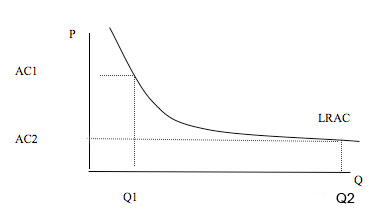Economies of scale occur when increased output leads to lower unit costs. (lower average costs)
Diagram Economies of Scale

This diagram shows that as firms increase output from Q1 to Q2, average costs fall from AC1 to AC2.
Examples of Economies of Scale include:
Tap Water – High Fixed Costs of a national network.To produce tap water, the water companies had to invest in a huge network of water pipes stretching throughout the country. The fixed cost of this investment is very high. However, since they distribute water to over 25 million households it brings the average cost down. However, would it be worth another water company building another network of water pipes to compete with the existing company? No, because if they only got a small share of the market, the average cost would be very high and they would go out of business. This is an example of a natural monopoly – most efficient number of firms is one.
Specialisation – Car Production
Another economy of scale is in the production of a complex item such as a motor car. The production process involves many different complex stages. Therefore to produce a car you should split up the process and have workers specialise in producing a certain part. e.g. a worker may become highly specialised in the design of a car; another in testing e.t.c. Specialisation requires less training of workers and a more efficient production process. However, if you have several distinct production processes it is most efficient to have a large output.
Bulk Buying – Supermarkets
Supermarkets can benefit from economies of scale because they can buy food in bulk and get lower average costs. If you had a delivery of just 100 cartons of milk the average cost is quite high. The marginal cost of delivering 10,000 cartons is quite low. You still need to pay only one driver, the fuel costs will be similar. True, you may need a bigger van, but the average cost of transporting 10,000 is going to be a lot less than transporting 100.
Marketing Economies
If you spend £100 on a national tv advertising campaign it is only worthwhile if you are a big national company like Starbucks or Coca Cola. If your output is small, the average cost of the advertising is much higher.
Risk Bearing – developing new drugs
To develop new drugs to treat illness takes considerable degrees of investment and research with no guarantee of success. Therefore this can only be undertaken by pharmaceutical companies with significant resources.
Container Principle. – more efficient transport and packaging.
If the surface area of a container increases by 100%, the volume it can carry will increase by 200%. Therefore, transporting bigger quantities leads to lower average costs.
Financial economies – a bigger firm gets a lower rate of interest on borrowing
Economies of scope. Economies of scope is different to economies of scale though there is same principle of larger firms benefiting from lower average costs.. This occurs when a large firm uses it existing resources to diversify into related markets. For example, Once a firm is producing soft drinks, it can use its marketing and distribution network to start producing alcoholic drinks
